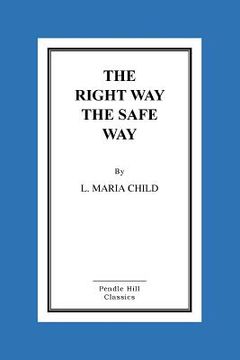Synopsis "The Right Way the Safe Way (in English)"
It is a common idea that the British West Indies were a mine of wealth before the abolition of slavery, and since that event have been sinking into ruin. To correct those erroneous impressions, I have carefully collected the following facts from authentic sources: - Official Reports, returned to the British Parliament, prove that the outcry about ruin in the West Indies began long before the abolition of slavery, and even before the abolition of the slave trade; and we ought, moreover, never to forget that this outcry related solely to the ruin of the masters; nobody expended a thought upon the ruin of their 800,000 laborers. As early as 1792, a Report to Parliament stated that, in the course of the preceding twenty years, one hundred and seventy-seven estates in Jamaica had been sold for the payment of debts; the cultivation of fifty-five had been abandoned; ninety-two were in the hands of creditors; and 80,021 executions, amounting to 22,500,000 sterling ($109,012,500), had been lodged in the provost marshal's office. In 1805, the Reports described the condition of the West India planters as one of "increasing embarrassment, and impending ruin." The Reports in 1807, 1808, 1812, 1830, and 1832, were still more lamentable. In 1830, four years before emancipation, Lord Chandos presented to Parliament a petition from West India planters and merchants, setting forth "the extreme distress under which they labored." In his speech, in support of the petition, he said, "They are reduced to a state in which they are obliged earnestly to solicit relief from Parliament. It is not possible for them to stand up against such a pressure any longer." Mr. Bright said: "The distress of the West India Colonies is unparalleled in the country. Many families, who formerly lived in comparative affluence, are reduced to absolute penury." The West India Reporter also quoted thus from a Report on the commercial state of the Colonies: "There are strong concurrent testimonies and proofs that, unless some speedy and efficient measures of relief are adopted, the ruin of a great number of the planters must inevitably take place." An able writer in the Edinburgh Review informs us that, "In the small island of St. Lucia an Encumbered Estate Court was established in 1833, and, small as that island is, [1] in the first eighteen months, liabilities were recorded to the enormous amount of 1,089,965 ($5,280,880); all debts incurred under slavery. Nor did that island stand alone. In each one of them the same state of things prevailed." The laborers were decreasing rapidly. The Edinburgh Review declares: "What gave the death-blow to slavery, in the minds of British statesmen, was the appalling fact that the Population Returns, from only eleven of the Colonies, showed that, in the course of twelve years, the slaves had decreased 60,219. Had similar returns been procured from the other seven Colonies, they must have shown a decrease of little, if at all, less than 100,000. Had the same rate of decrease gone on, one century would have seen the extinction of slavery by the extinction of the slaves."[2] Production was also decreasing. A table of exports, in the Appendix to Mr. Bigelow's work on Jamaica, shows that, in the ten years ending 1830, there was a decrease in that island, of 201,843 hogsheads of sugar, from the amount in the ten years ending with 1820. In view of these, and similar facts, the Edinburgh Review says: "Plainly, the artificial, arbitrary interference of law with the freedom of man, and freedom of trade, was bringing about the extinction of the working-class, and was whirling their masters along to utter ruin."

